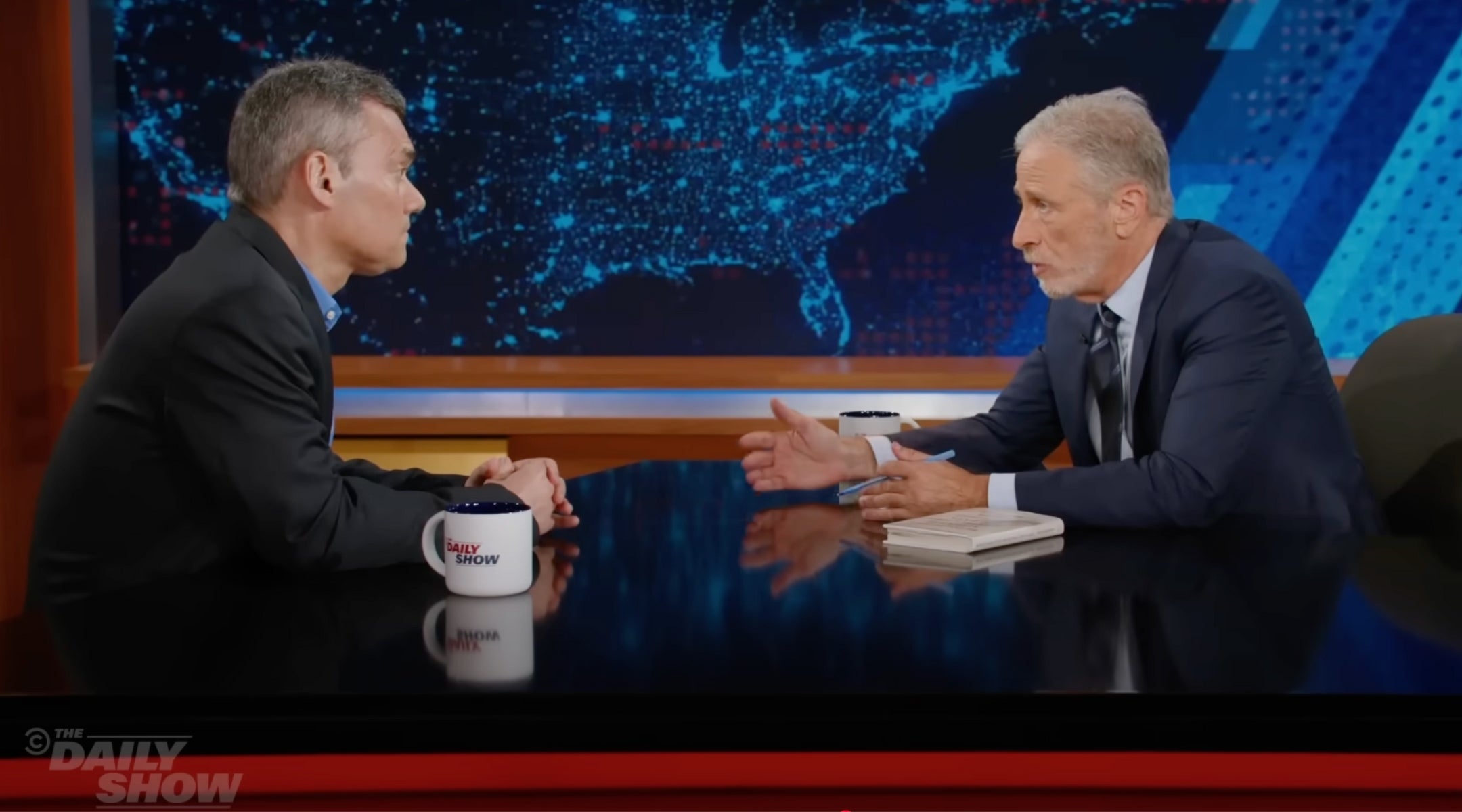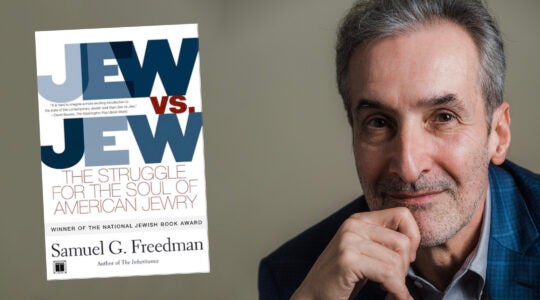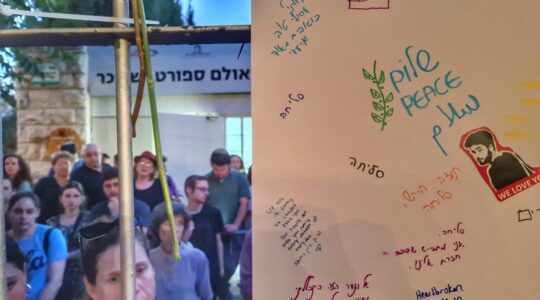Jon Stewart hosted writer Peter Beinart on “The Daily Show” Monday night, for a conversation in which the two Jewish liberals agreed that the war in Gaza was “horrific” and that Israel bore near exclusive blame for the suffering endured by Palestinians in the 22 months since the Oct. 7 attacks.
While the two discussed U.S. and Israeli policy, condemning both, the conversation was perhaps more significant for the way in which two American Jewish near-contemporaries (Beinart is 52, Stewart is 64) wrestled with the lessons of their Jewish upbringings on a popular late night TV show.
Picking up on a theme in Beinart’s latest book, “Being Jewish After the Destruction of Gaza: A Reckoning,” Stewart and his guest challenged the narrative of Jewish victimhood in justifying Israeli actions, and urged fellow Jews to acknowledge both Jewish history and Palestinian experiences.
“All of our holidays, the entire ethos for me of being Jewish — and I don’t doubt that there are people that have a radically different interpretation than I do — but it’s all about, like, we were about to be wiped out,” said Stewart, suggesting that the lessons of Hanukkah and Purim were being misused to justify a war that he called “so self-evidently inhumane and horrific.”
Beinart, an observant Jew, agreed, referring both to the Hebrew Bible and the Talmud.
“Part of recognizing us as human, as Jews, as fully human, is recognizing that we are capable of [being] the victims and … victimizers, and we have to recognize that in order to prevent us from falling into the trap of thinking that every single situation is the equivalent of what was happening in the Soviet Union, Czarist Russia or in Nazi Germany,” said Beinart, an editor-at-large at the leftist Jewish Currents magazine and a professor at CUNY’s Newmark School of Journalism.
For Israelis and Palestinians, he said, “the power dynamic is reversed. In Israel-Palestine, it’s Jews who all enjoy legal supremacy and citizenship, and Palestinians who are denied basic rights. And we have to recognize that that’s possible, and we have to fight against it for our own sake and for the sake of our honor.”
In the course of the 18-minute discussion, Stewart seemed the more agitated about the sorry state of Jewish discourse around the war, while Beinart returned repeatedly to the theme that Israel and the United States have failed to reward Palestinians who over the years offered nonviolence and a negotiated settlement as an alternative to violence.
Missing from the conversation, as some viewers pointed out, was any discussion of Israelis themselves, or the vulnerability they have felt before and especially since Oct. 7.
“At no point do we hear from either one a need to hear the voices, the pain, fears and anger of their Israeli peers, the vulnerability, what leads 35-year-old men to show for reserve duty and do the things they do,” wrote J.J. Goldberg, the former editor of The Forward, on Facebook.
But the segment represented a kind of Jewish soul-searching rare on such public platforms, as Goldberg also pointed out. And in veering into the internal divides among Jews — between those who have been clamoring both for the war’s end and a political change in Israel, and those who insist Israel is doing what it must to eliminate Hamas and ensure the future safety of Israelis — the conversation captured the kind of anguish and discord acted out around Shabbat tables and in social media chats over the past two years.
Stewart complained that he has been “told that I have to shut up because I risk the Jewish state by speaking out.”
“I would say the opposite,” he said, referring to uncritical defenders of the war. “I think they’re putting the likelihood of a surviving Jewish state much more at risk with this type of action. I think they’re the ones that are being antisemitic.”
At another point he said, “I feel like I don’t know how to talk to even friends of mine that have gone there, and I imagine they feel the same way.”
In turn, Beinart suggested that American Jews have betrayed their own democratic and Jewish values by not considering the Palestinian side of the story.
“It’s a problem in our community that Palestinians are not invited to speak in synagogues, the kids aren’t given books by Palestinians in Jewish schools and Jewish camps,” he said, “because when you listen to Palestinians … you realize how brutal [their] experience has been.”
The audience applauded wildly throughout the conversation, especially when the two agreed that the United States should intervene and stop the fighting. And the comments on the YouTube page were largely positive — no doubt reflecting a consensus among Stewart’s self-selecting liberal audience.
Defenders of Israel and the war were understandably put off by the segment. Wrote one Israeli activist on Facebook: “I see two people blind to the reality of Israel’s existential struggle against radical Islam and generations of Palestinian recidivism high on their own self regard.” HonestReporting, the pro-Israel watchdog, called it “18 minutes of finger-pointing. No Israeli voices. No accountability for Hamas. Just two self-righteous men tokenizing themselves on national TV.”
The “Daily Show” segment and the reaction thus became a mass media illustration of Ezra Klein’s recent New York Times essay, “Why American Jews No Longer Understand One Another” — while refuting Klein’s thesis that the Jewish divide over Israel is largely a generational one.
Last week friends on Facebook were discussing why we should pay attention to celebrities who weigh in on Israel. (The subject was Mandy Patinkin, who gave an interview to the New York Times complaining, like Stewart, that he had been harangued by fellow Jews for criticizing the war and the Israeli government.)
I responded as a journalist, but also as someone who tries to understand, as my employer likes to say, all sides of the Jewish story: The issue is not caring about what a celebrity has to say, but whether we care about how Jews are thinking and talking about the war, Israel and the Palestinians.
Stewart has always been an avatar for a certain kind of highly assimilated, secular Jew who makes his Jewish identity a prominent part of his public persona. Right or wrong, he, no less than a pro-Israel influencer, is representative of a Jewish cohort that is engaged with Israel, even if to criticize it. If we listen only to the people we agree with, we’ll fail to fully understand who we are and what we’ve become.
JTA has documented Jewish history in real-time for over a century. Keep our journalism strong by joining us in supporting independent, award-winning reporting.







